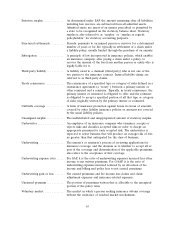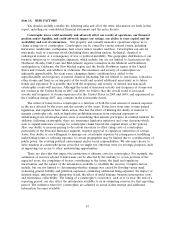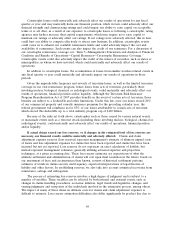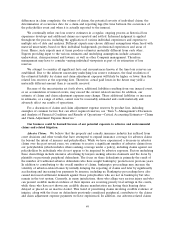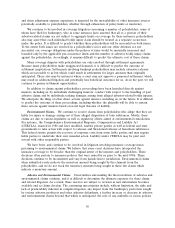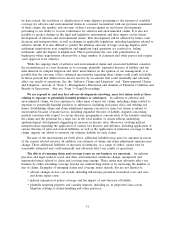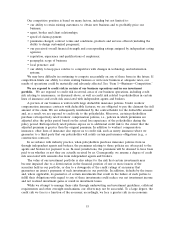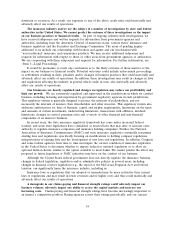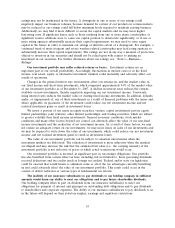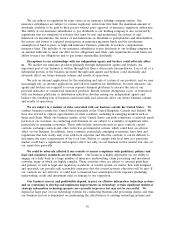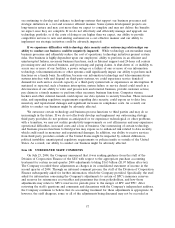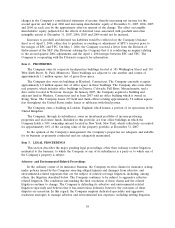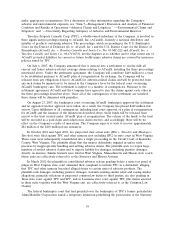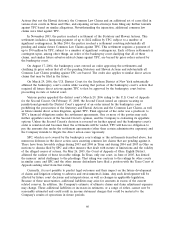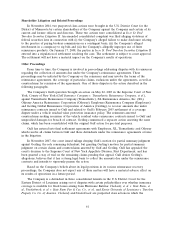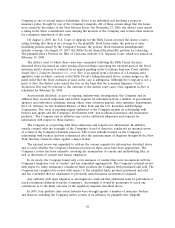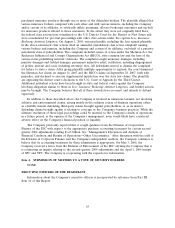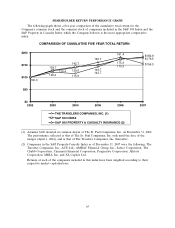Travelers 2007 Annual Report Download - page 67
Download and view the complete annual report
Please find page 67 of the 2007 Travelers annual report below. You can navigate through the pages in the report by either clicking on the pages listed below, or by using the keyword search tool below to find specific information within the annual report.ratings may not be maintained in the future. A downgrade in one or more of our ratings could
negatively impact our business volumes, because demand for certain of our products in certain markets
may be reduced or our ratings could fall below minimum levels required to maintain existing business.
Additionally, we may find it more difficult to access the capital markets and we may incur higher
borrowing costs. If significant losses, such as those resulting from one or more major catastrophes, or
significant reserve additions were to cause our capital position to deteriorate significantly, or if one or
more rating agencies substantially increase their capital requirements, we may need to raise equity
capital in the future in order to maintain our ratings or limit the extent of a downgrade. For example, a
continued trend of more frequent and severe weather-related catastrophes may lead rating agencies to
substantially increase their capital requirements. The ratings are not in any way a measure of protection
offered to investors in our securities and should not be relied upon with respect to making an
investment in our securities. For further discussion about our ratings, see, ‘‘Item 1—Business—
Ratings’’.
Our investment portfolio may suffer reduced returns or losses. Investment returns are an
important part of our overall profitability. Accordingly, fluctuations in interest rates or in the fixed
income, real estate, equity or alternative investment markets could materially and adversely affect our
results of operations.
Changes in the general interest rate environment affect our returns on, and the market value of,
our fixed income and short-term investments, which comprised approximately 94% of the market value
of our investment portfolio as of December 31, 2007. A decline in interest rates reduces the returns
available on new investments, thereby negatively impacting our net investment income. Conversely,
rising interest rates reduces the market value of existing fixed income investments. In addition, defaults
under, or impairments of, any of these investments as a result of financial problems with the issuer and,
where applicable, its guarantor of the investment could reduce our net investment income and net
realized investment gains or result in investment losses.
We invest a portion of our assets in equity securities, venture capital investments, private equity
limited partnerships, joint ventures, other limited partnerships, and trading securities, which are subject
to greater volatility than fixed income investments. General economic conditions, stock market
conditions and many other factors beyond our control can adversely affect the value of our non-fixed
income investments and the realization of net investment income. As a result of these factors, we may
not realize an adequate return on our investments, we may incur losses on sales of our investments and
we may be required to write down the value of our investments, which could reduce our net investment
income and net realized investment gains or result in investment losses.
The value of our investment portfolio can be subject to valuation uncertainties when the
investment markets are dislocated. The valuation of investments is more subjective when the markets
are illiquid and may increase the risk that the estimated fair value (i.e., the carrying amount) of the
investment portfolio is not reflective of prices at which actual transactions would occur.
Our investment portfolio is invested, in significant part, in tax-exempt obligations. Our portfolio
has also benefited from certain other tax laws, including, but not limited to, those governing dividends-
received deductions and tax credits (such as foreign tax credits). Federal and/or state tax legislation
could be enacted that would lessen or eliminate some or all of the tax advantages currently benefiting
us and could adversely affect the value of our investment portfolio. This result could occur in the
context of deficit reduction or various types of fundamental tax reform.
The inability of our insurance subsidiaries to pay dividends to our holding company in sufficient
amounts would harm our ability to meet our obligations and to pay future shareholder dividends.
Our holding company relies in part on dividends from our insurance subsidiaries to meet our
obligations for payment of interest and principal on outstanding debt obligations and to pay dividends
to shareholders and corporate expenses. The ability of our insurance subsidiaries to pay dividends to us
in the future will depend on their statutory surplus, earnings and regulatory restrictions.
55


